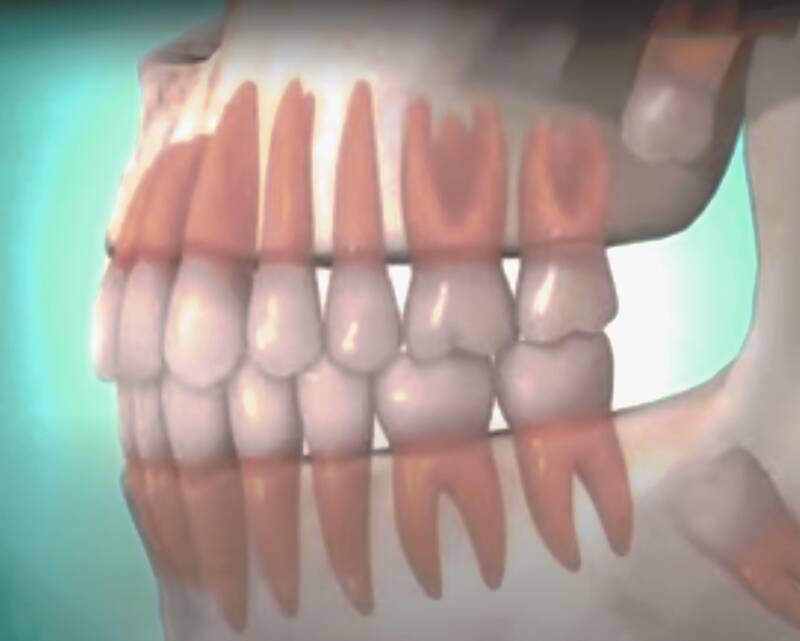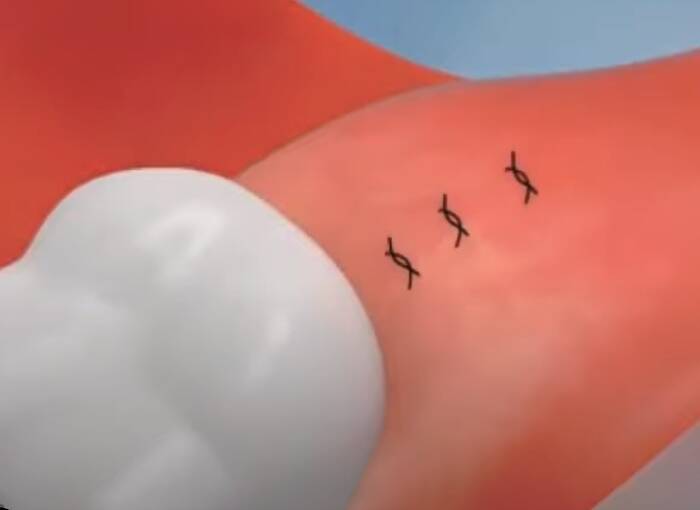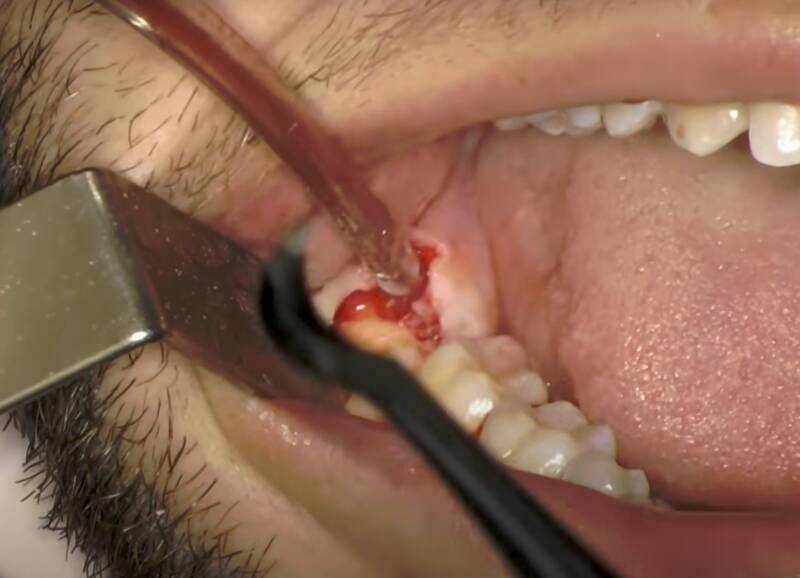Wisdom teeth problems can occur when the teeth do not have enough room to emerge properly. This can cause the wisdom teeth to become impacted, which means they are trapped in the gum tissue or jawbone and cannot fully emerge. This can lead to pain, swelling, and infection in the surrounding area.
I. What are wisdom teeth?
Wisdom teeth are the teeth that are located at the bottom of the jaw. They are the third molars, which were very useful to our ancestors for chewing meat.
Before the human species started cooking meat and softening it, the wisdom teeth made chewing easier.
Today, they are teeth that often cause oral health problems. There is a debate about their real usefulness, and the necessity to keep them or not.
II. Does everyone have wisdom teeth
Nowadays, wisdom teeth do not automatically come out in all jaws. Today, more and more people do not develop wisdom teeth as adults.
The reasons for this are not known but it may be related to the evolution of the species.
Furthermore, it is also possible that some people have 4 wisdom teeth, or all of them, while others have more than 4.
Even scientists cannot figure out what accounts for these differences in the development of wisdom teeth in people.
III. Benefits of keeping wisdom teeth
Wisdom teeth do not have to be automatically extracted or removed. If they do not cause you pain and if they are able to grow properly, you can keep them.
The advantages of keeping your wisdom teeth are significant. First, you will save yourself an expensive and painful operation. In addition, your wisdom teeth can be used in the event that you lose one or more molars.
Opinions about wisdom teeth have begun to change. More and more experts believe that wisdom teeth must have a purpose. They are believed to provide better jaw support and increase chewing ability.
IV. Wisdom teeth removal?
1. Why are wisdom teeth removed?
Wisdom teeth are often removed as soon as they appear, and for several reasons. It is possible that the wisdom teeth are in the wrong position and are growing in the wrong way.
In this case, it is advisable to remove your wisdom teeth. Growing teeth like this cause pain, which is one reason to have them removed.
Another reason to have your wisdom teeth removed is the possibility of dental crowding because of them.
Overcrowding occurs when wisdom teeth do not have enough room in the jaw, so they grow in and push out other teeth.
Impacted wisdom teeth, i.e. those that grow below the surface of the gum, or semi-in impacted teeth, must be removed. These teeth cause pain and are a risk of inflammation and infection.
2. What are the Possible complications
The possible complications when you have your wisdom teeth extracted are related to the operation itself first.
Wisdom teeth extractions, like any other tooth extraction, can lead to infection. Even with antibiotic treatment, the risk exists.
Another possible risk is what is called oral-sinus communication. This complication is caused by the proximity of the wisdom teeth to the maxillary sinuses. In this type of situation, wisdom teeth removal can create a sort of opening between your mouth and your sinuses.
A dry socket is another problem that can occur after wisdom teeth extraction. This is a healing concern often experienced by smokers.
3. How much does wisdom teeth extraction cost (in the USA)
The cost of wisdom teeth extraction in the United States depends on many things, including the condition of the teeth and the location and facility of the extraction.
In absolute terms, you can expect to pay between $75 and $250 per wisdom tooth extracted with only local anesthesia. If you use general anesthesia, then the wisdom tooth extraction will cost you between $600 and $1100.
For impacted wisdom teeth, it will cost between $225 and $600 per tooth extracted, using local anesthesia.
4. Problems with impacted wisdom teeth
Impacted wisdom teeth are able to move under the gum over time, causing pain. They can also become infected by partially piercing the gum tissue. Swelling of the gum is then possible, as well as some redness in this area.
A cyst or abscess can develop from an impacted wisdom tooth because it is pressing into the gum.
The impacted wisdom tooth can also damage neighboring teeth while remaining under the jaw.
5. How soon will I recover?
The recovery time from a wisdom tooth extraction varies from person to person, and from case to case. However, it is estimated that it takes 7 to 10 days for a person who has had one or more wisdom teeth removed to be able to eat like they used to.
The pain may last for a short or long time, and there are certain precautions that should be taken after a wisdom tooth extraction.
6. Food to eat and foods to avoid
In the hours following a wisdom tooth extraction, it is important not to spit, eat or drink. Then, to help your healing process, avoid eating foods that are too hard and crunchy, which will put your teeth to work.
Instead, eat soft, warm foods and products. Soups, broths, fruits such as bananas, or foods such as scrambled eggs; are the go-to meals for the days following your wisdom teeth extraction.
V. Symptoms of wisdom teeth infection
When your wisdom teeth are infected, one or more symptoms should alert you. Pain is one of the first signs of a tooth infection.
You will feel the pain that may be stabbing in the area where the wisdom tooth grows, which is the 3rd molar.
You will also notice swelling in this area, as well as possible redness. The swelling may even show up on the cheek, which may be swollen.
Bad breath and an unpleasant taste are other signs of an infected wisdom tooth.
VI. What is a dry socket wisdom tooth?
In a dry socket, the healing process is interrupted by an infection. This infection occurs even before the clot, which is supposed to heal the area, has formed. A dry socket is a complication following a wisdom tooth extraction, with symptoms such as pain and swelling.
It occurs within a few days of the wisdom tooth extraction, most often on the outer teeth. You will feel pain as intense as that of a toothache. You will have difficulty chewing or even opening your mouth. It is then important to return to your dentist.
VII. Where does wisdom tooth pain come from?
Wisdom teeth pain can be caused by a number of things. Wisdom teeth can be painful when they are growing in, especially when they are impacted. This causes them to press into the gums, which can cause pain.
It is also possible for wisdom teeth to hurt because they are infected, which is common with impacted and semi-impacted wisdom teeth.
Infection occurs because the wisdom teeth are not growing in a healthy way, are growing against their neighbors, or are not breaking through the gum properly.

VIII. How to Relieve Wisdom Teeth Pain (Before Extraction)
There are a few ways to relieve the pain of wisdom teeth before tooth extraction. You can take paracetamol or another pain reliever that will help you to be pain-free.
You can also turn to more natural methods, such as saltwater mouthwash. Put a teaspoon of salt in a glass of warm water and rinse your mouth with it several times a day. Do this while waiting for your dental appointment.
If you experience pain from your wisdom teeth, it is important to see a professional dentist to find out what is causing the pain.
IX. How to Relieve Wisdom Teeth Pain (After Extraction)
To relieve your pain after your wisdom teeth are removed, you can use ice. Put ice cubes in a cloth and apply it to your sore cheek. Do this for about ten minutes until you feel relief.
You can also take painkillers, such as paracetamol, which will help you feel less pain. Your dentist will give you the dosage to follow.
Your diet should also be modified. Avoid alcohol and cigarettes, and eat warm or room-temperature foods.
If the pain persists for several days and gets worse, see your dentist.
X. Other Questions About Wisdom Teeth
1. How many wisdom teeth need to be removed?
The number of wisdom teeth to be extracted depends on their condition. But it appears that in order to balance the jaw, it is not advisable to remove a tooth on one side of the mouth and leave the other wisdom tooth on the other.
It is possible to remove all four teeth at once. However, if some patients are too nervous, the extraction of the 4 teeth can be done in two steps
It is possible to extract two wisdom teeth in the first operation and two more in the second operation.
The decision can be made by the patient, in agreement with the dentist.
2. Is there a risk of having a cut nerve?
It is indeed possible to cut the inferior alveolar nerve, which is a nerve that runs under the lower mandibular bone. This nerve is often very close to the wisdom teeth.
During the removal of the wisdom teeth, there is a risk of hitting this nerve. This will result in numbness or reduced sensitivity of the lower lip, chin, or tongue.
This insensitivity can last several weeks or months. The consequences depend on the injury to the nerve.
3. What is the care after surgery for the extraction of wisdom teeth?
After the removal of your wisdom teeth, take painkillers, which will help you cope with the pain. You can also apply cold to your cheek.
In terms of care, you should rest and avoid physical activities to avoid increasing blood flow.
The dentist will place cotton balls on the extraction area and you should keep them there for 20 minutes. Do not rinse your mouth and avoid spitting during this day.
Definitely do not take aspirin after your tooth extraction, as this can increase your bleeding.
4. What age do wisdom teeth come in?
There is no set age for wisdom teeth to appear. It can be estimated that wisdom teeth start to appear from the age of 15, and can continue until the age of 75.
It is advisable to consult your dentist from your teenage years onwards, to check if you have wisdom teeth growing under your gums, which you are not aware of.
The growth of wisdom teeth is, moreover, not common to everyone. Some people are born and grow up without ever having any.
5. How to Sleep After a Wisdom Tooth Extraction
Right after your tooth extraction, you may still be in pain, as well as bleeding. To sleep, you should elevate your head, adding pillows if necessary to support your neck.
This position will relieve your pain and reduce your dental bleeding.
If you are in too much pain, don’t hesitate to take painkillers before going to bed.

6. How do I know if I have a wisdom tooth?
Although it is rare, it is possible for wisdom teeth to grow naturally without causing any problems. In these cases, all you have is 4 extra teeth in your mouth, without any problems.
Unfortunately, in the vast majority of cases, growing wisdom teeth cause pain. When wisdom teeth erupt, they are accompanied by jaw pain and swelling. You also have difficulty opening your jaw. In these cases, consult a dentist.
7. Can I remove my wisdom tooth at home?
No, it is not recommended to extract your wisdom tooth at home. A professional is required, as well as the proper tools. To relieve the pain of the extraction, an anesthetic must be administered, which cannot be done at home.
In addition, the position of the wisdom teeth is a risk, as they can get close to a nerve. This makes the removal of the wisdom tooth dangerous.
An X-ray is necessary to know the exact position of your wisdom teeth, and thus avoid damage from the extraction.
Sometimes it may be necessary to separate the different tooth roots during the extraction. Other complicated things to do at home.
8. Can wisdom teeth grow back?
Wisdom teeth are not baby teeth, but rather permanent teeth. This means that they are teeth that, once removed, cannot grow back.
Wisdom teeth grow during adulthood, hence their name. From the age of 15 to over 20, you can have wisdom teeth that grow in.
It should be noted, however, that not everyone grows wisdom teeth today.
9. How do dentists remove wisdom teeth?
Usually, before the extraction is started, a local anesthetic is administered to the patient. The extraction takes place in the dental office, after a consultation.
Once the anesthesia is administered, an incision is made in the gum. Then the bone around the wisdom tooth is cut away by the milling machine.
This allows the tooth to be freed up and the tooth to be extracted. Once the tooth is extracted, the area is cleaned by the dentist to remove bacteria and prevent possible infection.
Absorbable sutures are then applied and the dentist checks the patient’s general condition before leaving with post-operative instructions.
10. Will a wisdom tooth fall out?
A wisdom tooth is not known to fall out on its own. Generally, because of its position in the jaw, the wisdom tooth can only fall out if it is affected by periodontitis. The gingival narrowing can actually expose the tooth enough to cause it to fall out.
Wisdom teeth are very often impacted or semi-impacted, which means that they remain buried under the gum. As a result, they do not protrude far enough from the jaw to fall out.
Professional tooth extraction is usually the only way to remove your wisdom teeth when they are a problem.
11. Is wisdom teeth removal a major surgery?
Wisdom tooth removal is still a delicate surgical procedure. Local or outpatient anesthesia is often used.
Despite the fact that it is a nerve-wracking operation, it is a fairly simple medical procedure that is often performed. The risks of complications following a dental extraction are not numerous.
One or more wisdom teeth can be extracted in a dental office or clinic. The operation itself, because it requires the use of anesthesia, does not hurt. Dental pain can be preoperative (before the extraction) or postoperative.
12. How do you know a wisdom tooth is infected?
If you feel pain in the area of the wisdom tooth, then it is possible that it is infected.
Another thing that can let you know that your tooth is affected is the swelling that you will notice in the area. You may also have an unpleasant taste in your mouth, as well as bad breath.
Wisdom tooth infection, or even tooth pain, requires an appointment with a dentist. Get a consultation.
13. Is 25 too old to have wisdom teeth removed?
It is always better to have wisdom teeth removed as soon as possible. There are many harmful consequences that can be avoided if you do.
For example, the roots of the wisdom teeth will not be too close to the nerve in adolescence, which will reduce the risk of hitting the nerve during extraction.
Also, in adolescence, the bone and soft tissue are easier to operate on and the tooth will be extracted more easily.
Nevertheless, at the age of 25, it is still possible to have your wisdom teeth removed by a dentist without too much worry. It is after this age that the operation will need to be done by a maxillofacial specialist.

